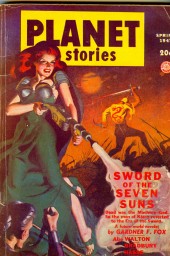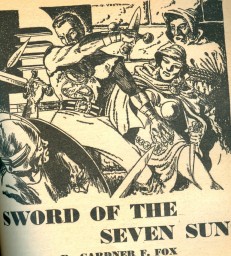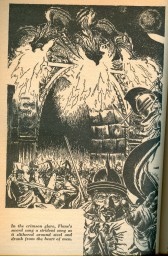 Planet Stories is one of the places where sword and sorcery fiction went undercover from the mid 1940s to the early 1950s. The magazine published unabashed adventure fiction with pseudo-scientific trappings. Space fantasy is a good term for this sort of fiction. Leigh Brackettt, Ross Rocklynne, Bryce Walton, Emmett McDowell, Albert de Pina, and Ray Bradbury were all steady contributors at this time.
Planet Stories is one of the places where sword and sorcery fiction went undercover from the mid 1940s to the early 1950s. The magazine published unabashed adventure fiction with pseudo-scientific trappings. Space fantasy is a good term for this sort of fiction. Leigh Brackettt, Ross Rocklynne, Bryce Walton, Emmett McDowell, Albert de Pina, and Ray Bradbury were all steady contributors at this time.
Right behind Leigh Brackett was Gardner F. Fox (1911-1986), probably best known for his comic book writing. He had started in the funny books in 1937. His pulp story was in 1944 for Weird Tales. He had a total of ten stories in Planet Stories from 1945 to 1953. He had three stories in Weird Tales, one in Amazing Stories, and two comic strips in the pulp-comic hybrid Out of This World Adventures.
“Sword of the Seven Suns” (Planet Stories, Spring 1947) was Fox’s fifth story in Planet and one of his best. Fox’s influences appear to be Edmond Hamilton and Robert E. Howard. I have joked that “Sword of the Seven Suns” reads like a collaboration of a hung over Hamilton and Howard.
The story starts with a prologue of a space ship crash landing in the desert on a planet in the Deneb system into a giant prism. The story then starts in earnest with Flane, son of the recently deceased Princess Gleya eluding the mekniks. He attempts to use a key on “The Machine” housed in a temple to start it up. Apparently, the Machine went dead 25 years earlier. It supplied energy for light, transportation, heat etc. The key does not work and Flane has to get out of Dodge.
in the Deneb system into a giant prism. The story then starts in earnest with Flane, son of the recently deceased Princess Gleya eluding the mekniks. He attempts to use a key on “The Machine” housed in a temple to start it up. Apparently, the Machine went dead 25 years earlier. It supplied energy for light, transportation, heat etc. The key does not work and Flane has to get out of Dodge.
“His blade drove in like a beam of light, twirled the blade of the nearest guard in a circular envelopment, wresting it from his fingers to send it flashing high in the air. Sidestepping the lunge of the other guard, Flane slithered his blade through his opponent’s neck, watched him gargle blood in his throat as he plunged.”
Flane aids Vawdar, who is attempting to figure out the key to the Machine escape with some help from the southern city of Moornal. They are led by a beautiful girl with red hair (Aevlyn). Vawdar dies from a thrown dagger to the back but not before telling Flane, the key is not what they thought is might be.
 Riding into the desert on his one horned horse (called a Megathon), he finds the crashed space ship at the broken prism. Spending months searching through the wreck, he finds a ray gun and a sword with seven globules of light set in the blue hilt. Flane also finds out he is the son of the couple that piloted the ship.
Riding into the desert on his one horned horse (called a Megathon), he finds the crashed space ship at the broken prism. Spending months searching through the wreck, he finds a ray gun and a sword with seven globules of light set in the blue hilt. Flane also finds out he is the son of the couple that piloted the ship.
Aevlyn and her father arrive in a magnetic powered air-ship taking Flane to Moornal. The mekniks are allying with the Darksider barbarians against the dulars. There appears to be some sort of cast system going on.
Flane gets the idea of trying to reason with the Darksiders. He tries to no avail, having to turn the ray gun on their catapults. The air-ship is damaged, so Flane and all the crew except one get off at a mountain pass to stop the Darksiders. There is then a battle that would make Robert E. Howard proud with lots of spear, arrows, axes, and sword work.
Down to three people, Flane pulls the blue hilted sword he found. The ray gun hits and disintegrates half of the blade and the globes in the hilt glow brightly. The Darksiders recognize it as the key to the Machine. Why these barbarians would have a prophecy regarding the Machine is never explained.
The Darksiders provide an escort for Flane to return to the city of Klarn. Flane sneaks into the temple and tries the sword into a diamond shape slot. Nothing happens, war is going to happen all over the planet and civilization is going down. Then Flane gets the idea of the changing the hold of the sword at the hilt and pushes the sword into the slot. This time it works. It doesn’t make sense but there you have it.
There are lapses in this story that don’t make sense. It probably would have been better with another 5,000 words. I guess you are just sit back, turn off your brain, and go along for the ride. Fox’s later paperback novels The Arsenal of Miracles and Escape Across the Cosmos are very much in his Planet Stories mode but with the advantage of being longer to fill in some details.
I am surprised that Don Wollheim never reprinted any Fox stories in anthologies like Adventures on Other Planets. A mass-market paperback collection of his pulp action science fiction was probably never going to happen. I am surprised that a comic book publisher never put out a book of his fiction. There are a lot of aging comic book fans who would buy a book of Fox’s fiction.
I love this Sword and Planet stuff! “Star Wars” is, at heart, this kind of space-opera (with the mystic Force and glowing swords). Other examples abound, though none quite as popular.